Auto ingest data to Snowflake with Snowpark Python API and RSA key based authentication
This blog is about that part of Data Engineering where we want to automate the ingestion data files locally or from S3 datalakes to the cloud-based data warehouse Snowflake with help of Snowpark Python Libraries and API to process SnowSQL commands.
For that we will utilize besides Snowflake itself, the Python package Snowpark and its API.
For the API authentication with Snowpark there are three options available:
- regular basic authentication with login & password
- Single Sign On (SSO) and
- Key based authentication.
I decide to use the latter Key based authentication as it is the preffered method anytime when SSH’ing into servers, saving time and preventing cli prompts that could hinder automation.
Let’s get a fresh key created with openssl:
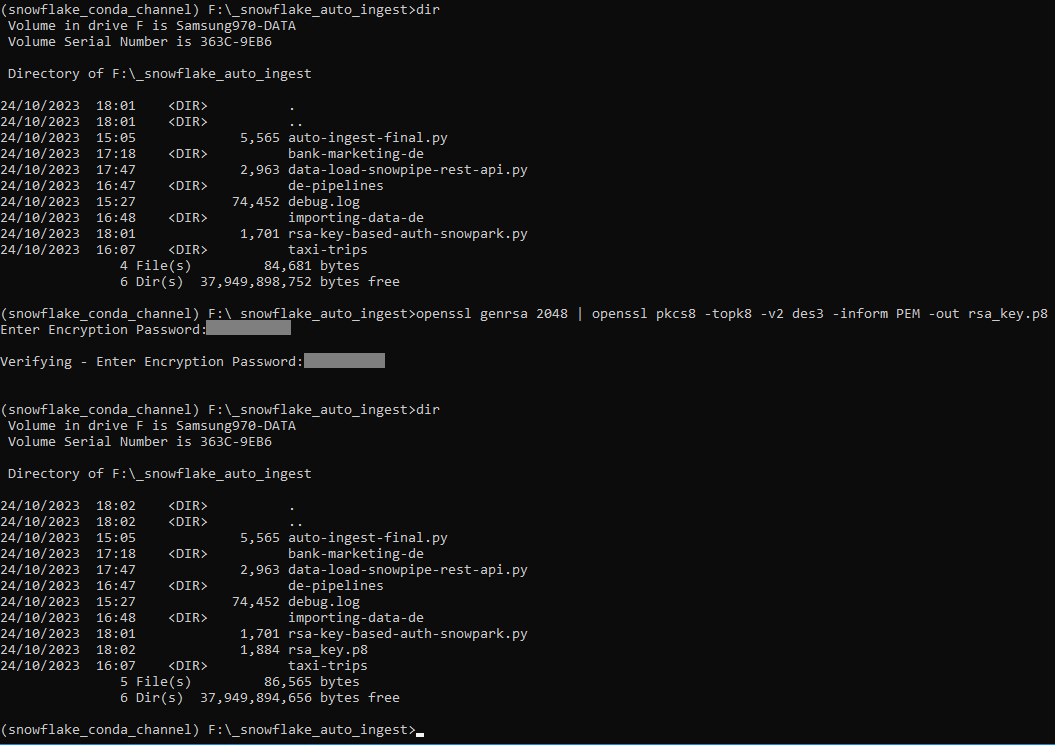 Generating an RSA key
Generating an RSA key rsa_key.p8 for authentication (in picture still password, later redone without)
Having already setup an API users in my Snowflake instance [users/roles], it is time to add the public key to the user that has been assigned for running the Python script later.
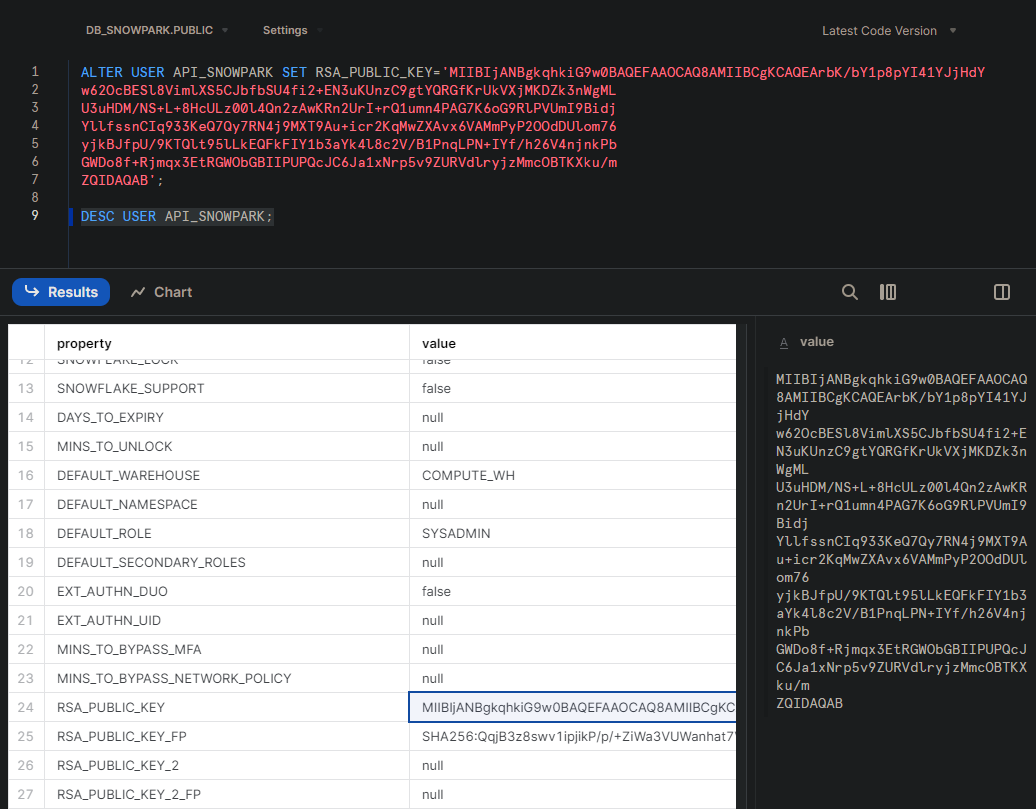 Assigning the Public key to the designated user account plus verifying user account property “RSA_PUBLIC_KEY” for being set
Assigning the Public key to the designated user account plus verifying user account property “RSA_PUBLIC_KEY” for being set
In order to prepare auto processing I have to set up a few things first, such as the Database itself, a named stage for incoming files (landing zone) and file formats that are required lateron.
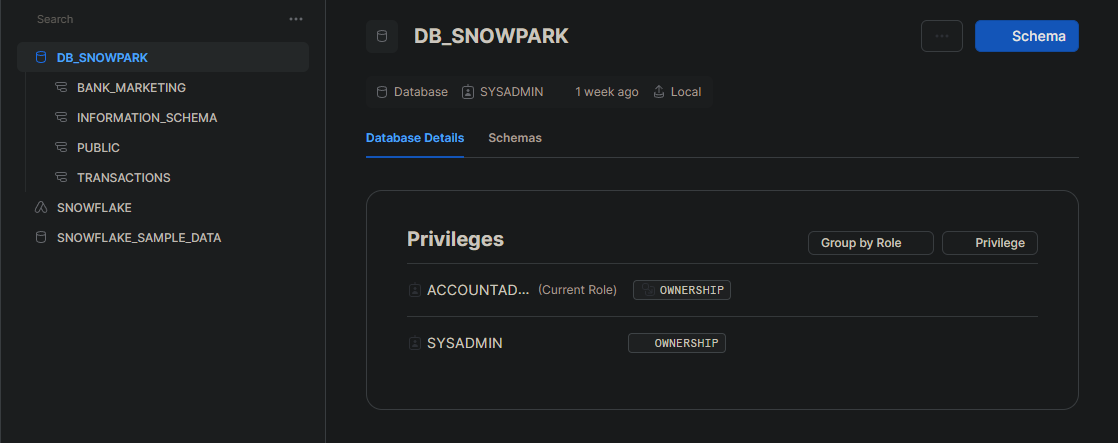 Creating DB through GUI
Creating DB through GUI
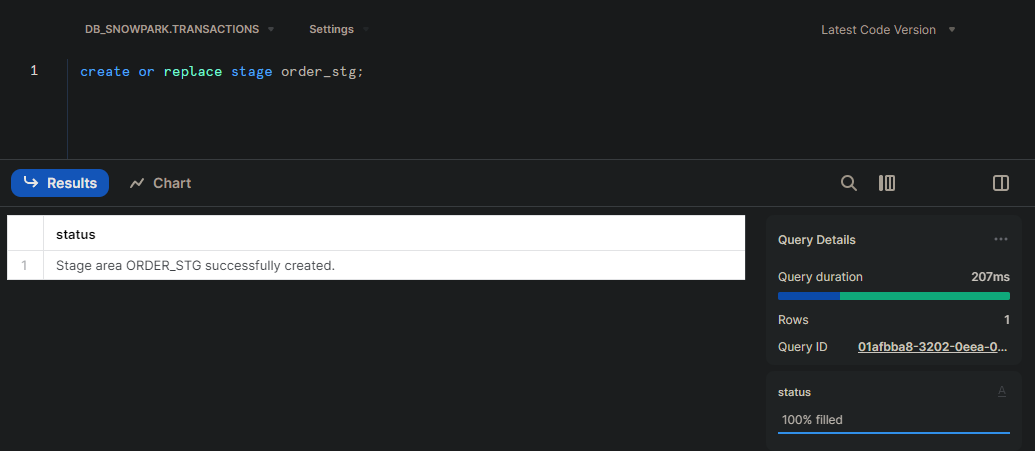 Creating named stage through SQL WORKSHEET
Creating named stage through SQL WORKSHEET
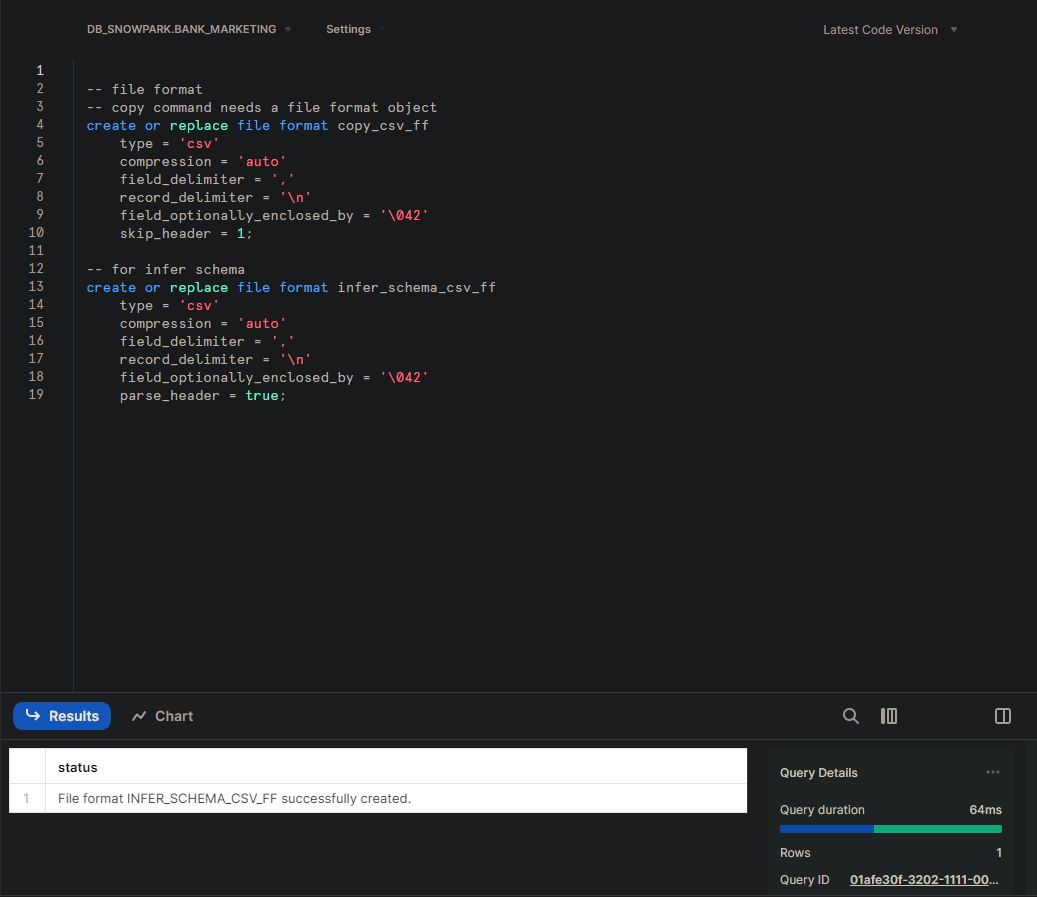 Creating file formats through SQL WORKSHEET
Creating file formats through SQL WORKSHEET
auto ingestion process overview
- upload designated files from local system into named stage (landing zone/bronze layer)
- list files in stage and collect file names
- Run infer schema
- Identify column names & data-type
- build DDL statements automatically for each file/table
- save SQL DDL/COPY statements as SQL files
- run DDL & COPY SQL commands
Step 1 - Upload designated files from local system into named stage (landing zone/bronze layer)
For file uploading I will use a first Python script that can automate the uploading of numerous files into the prepared named stage. It will utilize SnowSQL which is required anyway especially for large files and data chunks. With the PUT method files are uploaded sequentially. Our RSA keys are use for the key based authentication for the first time.
The final check confirms which files are uploaded and listed within the named stage ‘BANK_STG’ along with its byte-size, md5 hash and last modified date.
# loosely based on https://gist.github.com/vepetkov/a24b501e180cc5842b786ae680035239
import os
import snowflake.connector
from cryptography.hazmat.backends import default_backend
from cryptography.hazmat.primitives.asymmetric import rsa
from cryptography.hazmat.primitives.asymmetric import dsa
from cryptography.hazmat.primitives import serialization
# Params
whName = "COMPUTE_WH"
dbName = "DB_SNOWPARK"
schemaName = "BANK_MARKETING"
stgName = "BANK_STG"
#filePath = "./bank-marketing-de/bank_marketing.csv"
fileArray = ["./bank-marketing-de/bank_marketing.csv",
"./bank-marketing-de/campaign.csv",
"./bank-marketing-de/client.csv",
"./bank-marketing-de/economics.csv",
]
# rsa key based authentication
def snowpark_key_auth():
with open("rsa_key.p8", "rb") as key:
p_key= serialization.load_pem_private_key(
key.read(),
password=None,
backend=default_backend()
)
pkb = p_key.private_bytes(
encoding=serialization.Encoding.DER,
format=serialization.PrivateFormat.PKCS8,
encryption_algorithm=serialization.NoEncryption())
return pkb
# connect to snowpark
ctx = snowflake.connector.connect(
account='yfnsuct-cc62406',
user='API_SNOWPARK',
private_key=snowpark_key_auth(),
warehouse=whName,
database=dbName,
schema=schemaName
)
cs = ctx.cursor()
# Step-1
for filePath in fileArray:
# Upload each local file to the internal table stage
uploadStmt = f'put file://{filePath} @{stgName} auto_compress=false;'
cs.execute(f"use schema {schemaName};") # or set the Db & Scheme for the whole connection directly
cs.execute(uploadStmt)
# Check the uploads
cs.execute(f"list @{stgName};")
uploadedFiles = cs.fetchall()
# check upload status
print(uploadedFiles)
cs.close()
ctx.close()
[('bank_stg/bank_marketing.csv', 5094512, '6902dc210ce450be5c858bee3a18e55c', 'Wed, 25 Oct 2023 13:18:45 GMT'), ('bank_stg/campaign.csv', 1395408, '086c06bb40f01647ef58e095d40fb523', 'Wed, 25 Oct 2023 13:29:33 GMT'), ('bank_stg/client.csv', 2085824, '9d10bf6c799b7e8c8981913f5fcbd445', 'Wed, 25 Oct 2023 13:29:34 GMT'), ('bank_stg/economics.csv', 1229984, 'bafa17107ca5e51ba357a012dab01d43', 'Wed, 25 Oct 2023 13:29:36 GMT')]
Steps 2-7
# based on DE Simplified course code & modified
import os
from datetime import datetime
import logging
from cryptography.hazmat.backends import default_backend
from cryptography.hazmat.primitives.asymmetric import rsa
from cryptography.hazmat.primitives.asymmetric import dsa
from cryptography.hazmat.primitives import serialization
def logging_setup():
# create logger
logger = logging.getLogger('simple_example')
logger.setLevel(logging.DEBUG)
# create console handler and set level to debug
ch = logging.StreamHandler()
ch.setLevel(logging.DEBUG)
# create formatter
formatter = logging.Formatter('%(asctime)s - %(name)s - %(levelname)s - %(message)s')
# add formatter to ch
ch.setFormatter(formatter)
# add ch to logger
logger.addHandler(ch)
logging.basicConfig(filename='debug.log',
#encoding='utf-8',
level=logging.DEBUG)
return logger, ch
logger, ch = logging_setup()
# Params
whName = "COMPUTE_WH"
dbName = "DB_SNOWPARK"
schemaName = "BANK_MARKETING"
#stgName = "BANK_STG"
# separated to debug conda env packages
from snowflake.snowpark import Session
# rsa key based authentication
def snowpark_key_auth() -> Session:
# load the private rsa key
with open("rsa_key.p8", "rb") as key:
p_key= serialization.load_pem_private_key(
key.read(),
password=None,
backend=default_backend()
)
# private key text
private_key_text = p_key.private_bytes(
encoding=serialization.Encoding.DER,
format=serialization.PrivateFormat.PKCS8,
encryption_algorithm=serialization.NoEncryption())
connection_parameters = {
"ACCOUNT":"yfnsuct-cc62406",
"USER":"API_SNOWPARK",
"private_key" : private_key_text
}
# creating snowflake session object
return Session.builder.configs(connection_parameters).create()
#Generate dynamic ddl statement based on column name and type list
def generate_ddl_statement(column_names, data_types, table_name):
ddl_template = "CREATE TABLE IF NOT EXISTS {} (\n{});"
columns = []
for name, data_type in zip(column_names, data_types):
column_definition = f" {name} {data_type}"
columns.append(column_definition)
ddl_statement = ddl_template.format(table_name, ",\n".join(columns))
print("Got the table creation ddl statement")
return ddl_statement
#Generate dynamic copy statement based on table name
def generate_copy_statement(table_name,stage_name,csv_file_path,file_format):
copy_command = f"""
COPY INTO {table_name}
FROM @{stage_name}/{csv_file_path}
FILE_FORMAT = (FORMAT_NAME = '{file_format}')
"""
print(copy_command)
return copy_command
# call the main function
def main(snowpark_session,named_stg,copy_file_format,infer_schema_file_format):
#set the context (database, schema and warehouse)
snowpark_session.sql("use role sysadmin").collect()
snowpark_session.sql(f"use database {dbName}").collect()
snowpark_session.sql(f"use schema {schemaName}").collect()
snowpark_session.sql(f"use warehouse {whName}").collect()
# Step-2
# fetch all files under the named stage location
list_sql = "list @{}".format(named_stg)
stg_files = snowpark_session.sql(list_sql).collect()
# Step-3
# Iterate through the stage file entires....
for row in stg_files:
row_value = row.as_dict()
stg_file_path_value = row_value.get('name')
#split the file path and extract names
file_path, file_name = os.path.split(stg_file_path_value)
stg_location = "@"+file_path
# Dynamically create infer-schema SQL statement
# by passing stage location + file name
infer_schema_sql = """ \
SELECT *
FROM TABLE(
INFER_SCHEMA(
LOCATION=>'{}/',
files => '{}',
FILE_FORMAT=>'{}'
)
)
""".format(stg_location, file_name,infer_schema_file_format)
print(infer_schema_sql)
# Execute the infer schema SQL statement.
inferred_schema_rows = snowpark_session.sql(infer_schema_sql).collect()
col_name_lst = []
col_data_type_lst = []
# Step-4
# Iterate through the list & extract column-name/type
for row in inferred_schema_rows:
row_value = row.as_dict()
column_name = row_value.get('COLUMN_NAME')
column_type = row_value.get('TYPE')
#print(file_name.split('.')[0],column_name,column_type)
col_name_lst.append(column_name)
col_data_type_lst.append(column_type)
print("---------------")
print(col_name_lst)
print(col_data_type_lst)
table_name = file_name.split('.')[0]+"_tbl"
# Step-5
create_ddl_stmt = generate_ddl_statement(col_name_lst,col_data_type_lst, table_name.upper())
copy_stmt = generate_copy_statement(table_name,named_stg,file_name,copy_file_format)
# Step-6
sql_file_path = table_name+".sql"
with open(sql_file_path, "w") as sql_file:
sql_file.write("-- Following statement is creating table\n")
sql_file.write(create_ddl_stmt)
sql_file.write("\n-- Following statement is executing copy command \n")
sql_file.write(copy_stmt)
# Execute the ddl statement + copy statement
# Step-7
snowpark_session.sql(create_ddl_stmt).collect()
snowpark_session.sql(copy_stmt).collect()
#entry point
if __name__ == '__main__':
#capture start time
utc_start_time = datetime.utcnow()
#get snowpark session
snowpark_session = snowpark_key_auth()
#set tag before starting the process
snowpark_session.sql("alter session set query_tag = 'Start Snowpark Automation'").collect()
#stage name & fime format names.
named_stg = "BANK_STG"
whName = "COMPUTE_WH"
dbName = "DB_SNOWPARK"
schemaName = "BANK_MARKETING"
copy_file_format = "copy_csv_ff"
infer_schema_file_format = "infer_schema_csv_ff"
#calling main method
main(snowpark_session,named_stg,copy_file_format,infer_schema_file_format)
#record end time
utc_end_time = datetime.utcnow()
#set the query tag
snowpark_session.sql("alter session set query_tag = 'End Snowpark Automation'").collect()
#print overall execution time..
print("Execution Time", utc_end_time-utc_start_time)
SELECT *
FROM TABLE(
INFER_SCHEMA(
LOCATION=>'@bank_stg/',
files => 'bank_marketing.csv',
FILE_FORMAT=>'infer_schema_csv_ff'
)
)
---------------
['client_id', 'age', 'job', 'marital', 'education', 'credit_default', 'housing', 'loan', 'contact', 'month', 'day', 'duration', 'campaign', 'pdays', 'previous', 'poutcome', 'emp_var_rate', 'cons_price_idx', 'cons_conf_idx', 'euribor3m', 'nr_employed', 'y']
['NUMBER(5, 0)', 'NUMBER(2, 0)', 'TEXT', 'TEXT', 'TEXT', 'TEXT', 'TEXT', 'TEXT', 'TEXT', 'TEXT', 'NUMBER(2, 0)', 'NUMBER(4, 0)', 'NUMBER(2, 0)', 'NUMBER(3, 0)', 'NUMBER(1, 0)', 'TEXT', 'NUMBER(2, 1)', 'NUMBER(5, 3)', 'NUMBER(3, 1)', 'NUMBER(4, 3)', 'NUMBER(5, 1)', 'BOOLEAN']
Got the table creation ddl statement
COPY INTO bank_marketing_tbl
FROM @BANK_STG/bank_marketing.csv
FILE_FORMAT = (FORMAT_NAME = 'copy_csv_ff')
SELECT *
FROM TABLE(
INFER_SCHEMA(
LOCATION=>'@bank_stg/',
files => 'campaign.csv',
FILE_FORMAT=>'infer_schema_csv_ff'
)
)
---------------
['client_id', 'number_contacts', 'contact_duration', 'pdays', 'previous_campaign_contacts', 'previous_outcome', 'campaign_outcome', 'campaign_id', 'last_contact_date']
['NUMBER(5, 0)', 'NUMBER(2, 0)', 'NUMBER(4, 0)', 'NUMBER(3, 0)', 'NUMBER(1, 0)', 'NUMBER(2, 1)', 'NUMBER(1, 0)', 'NUMBER(1, 0)', 'DATE']
Got the table creation ddl statement
COPY INTO campaign_tbl
FROM @BANK_STG/campaign.csv
FILE_FORMAT = (FORMAT_NAME = 'copy_csv_ff')
SELECT *
FROM TABLE(
INFER_SCHEMA(
LOCATION=>'@bank_stg/',
files => 'client.csv',
FILE_FORMAT=>'infer_schema_csv_ff'
)
)
---------------
['id', 'age', 'job', 'marital', 'education', 'credit_default', 'housing', 'loan']
['NUMBER(5, 0)', 'NUMBER(2, 0)', 'TEXT', 'TEXT', 'TEXT', 'TEXT', 'TEXT', 'TEXT']
Got the table creation ddl statement
COPY INTO client_tbl
FROM @BANK_STG/client.csv
FILE_FORMAT = (FORMAT_NAME = 'copy_csv_ff')
SELECT *
FROM TABLE(
INFER_SCHEMA(
LOCATION=>'@bank_stg/',
files => 'economics.csv',
FILE_FORMAT=>'infer_schema_csv_ff'
)
)
---------------
['client_id', 'emp_var_rate', 'cons_price_idx', 'euribor_three_months', 'number_employed']
['NUMBER(5, 0)', 'NUMBER(2, 1)', 'NUMBER(5, 3)', 'NUMBER(4, 3)', 'NUMBER(5, 1)']
Got the table creation ddl statement
COPY INTO economics_tbl
FROM @BANK_STG/economics.csv
FILE_FORMAT = (FORMAT_NAME = 'copy_csv_ff')
Execution Time 0:00:06.682118
Contents of auto created SQL statement file in step 6 of the script bank_marketing_tbl.sql.
With this file I am able to review the inferred data types and eventually change and if required:
-- Following statement is creating table
CREATE TABLE IF NOT EXISTS BANK_MARKETING_TBL (
client_id NUMBER(5, 0),
age NUMBER(2, 0),
job TEXT,
marital TEXT,
education TEXT,
credit_default TEXT,
housing TEXT,
loan TEXT,
contact TEXT,
month TEXT,
day NUMBER(2, 0),
duration NUMBER(4, 0),
campaign NUMBER(2, 0),
pdays NUMBER(3, 0),
previous NUMBER(1, 0),
poutcome TEXT,
emp_var_rate NUMBER(2, 1),
cons_price_idx NUMBER(5, 3),
cons_conf_idx NUMBER(3, 1),
euribor3m NUMBER(4, 3),
nr_employed NUMBER(5, 1),
y BOOLEAN);
-- Following statement is executing copy command
COPY INTO bank_marketing_tbl
FROM @BANK_STG/bank_marketing.csv
FILE_FORMAT = (FORMAT_NAME = 'copy_csv_ff')
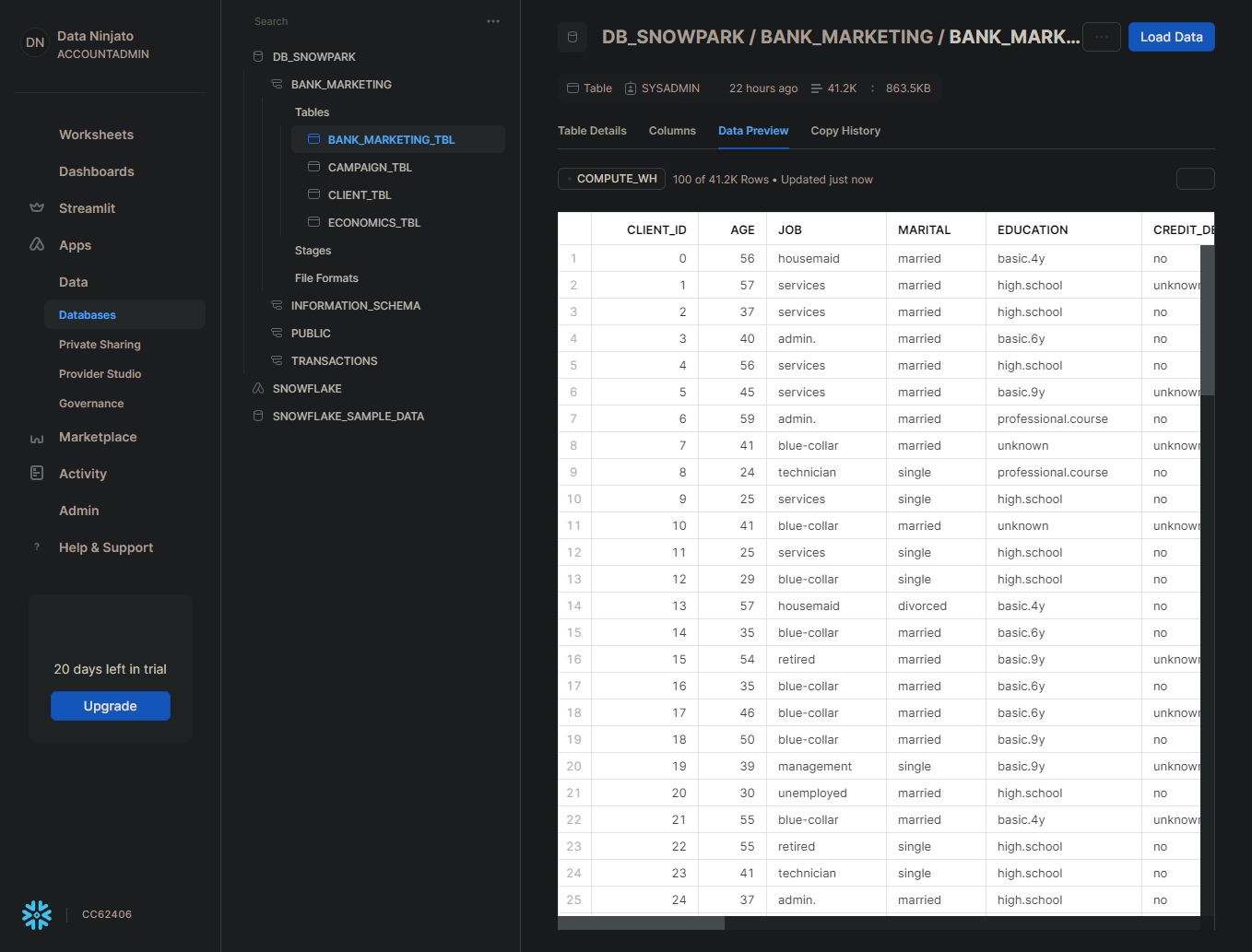 Snowflake GUI showing the auto ingested table BANK_MARKETING_TBL
Snowflake GUI showing the auto ingested table BANK_MARKETING_TBL
Conclusion
These scripts provide a quick start ingesting new data files and SQL statement handling, while being flexible and adjustable to one requirements. While being basic and universal these scripts could be a basis for more sophisticated automations, error detection & reporting etc pp.
I enjoyed Snowflake & Snowpark Python packages very much, as they were working reliable and smoothly. The codebase has apparently matured and no bugs have been noticed.
Next coming up I plan on progressing to silver and gold layers and start consuming the data, preferably NoSQL Data. This is Snowflake’s strengths to support attribute specific queries of semi-structured data such as JSON/XML.